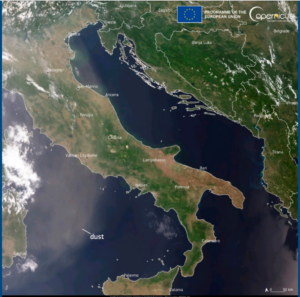In the period in which the Council of Europe adopted the new directive updating air quality standards for pollutants throughout the EU, Italy signed a new multi-year collaboration agreement on air quality monitoring with the European Centre for Medium-Range Weather Forecasts (ECMWF), which is responsible for the Copernicus CAMS service on atmospheric monitoring.
The agreement, which is led by the ISPRA institute in the project to strengthen the use of the resources made available by the Copernicus service to constantly monitor atmospheric pollutants, sees the participation of the University of Rome Tor Vergata together with ENEA, CNR-ISAC, the Italian Copernicus Academy Consortium, and 8 of the 21 regional agencies: ARPAE Emilia-Romagna, ARPA Lombardy, ARPA Campania, ARPA Liguria, ARPA Piedmont, ARPA Veneto, ARPA Umbria, and ARPA Valle d’Aosta.
The project focuses on the effects of air quality on human health, using innovative methods to improve pollen monitoring, through the use of CAMS products. This information is extremely useful, for example, for research and prevention of respiratory allergic diseases. At national level, data collected by POLLnet, the network for monitoring the biological component of particulate matter in the atmosphere, will be used. POLLnet is a network of the National System for Environmental Protection (SNPA) and is part of the National Environmental Information System (SINAnet).
These are some of the main tasks of the project: to estimate the amount of Saharan dust in the atmosphere in a timely and homogeneous manner throughout the national territory, to forecast the presence of pollutants in the air through a stronger collaboration between the institutional bodies that manage the forecasting tools, to detect the presence of pollens with greater precision and in particular those of the allergenic species that are most widespread in the Mediterranean areas.
The Earth Observation Group at Roma Tor Vergata comprises a permanent staff of 3 professors, 2 researchers, 7 PhD students and several contract and scholarship holders. For many years it has been responsible for various training activities on atmospheric remote sensing in the Master’s and PhD programmes active in Engineering, Mathematics, Physics and Natural Sciences at the university, also leading and participating in numerous international projects and with hundreds of publications to its credit.
In detail, the role that Tor Vergata will play in the project will mainly be twofold:
1. Continuing the activities already carried out in the first phase of the project, it will work on the organisation of training events in a hybrid mode, in which user communities interested in the use of CAMS (Copernicus Atmosphere Monitoring Service) data, in particular forecast data concerning the concentrations of the main air pollutants (CAMS European air quality forecast), will have the opportunity to understand how to access such data quickly and easily and obtain useful information for their activities. At the same time, in this second phase of the project, the university will work on the realisation of a MOOC (Massive Open Online Course) in which teaching units will be included in which the topics of air pollution, the use of CAMS data and satellite data for air quality monitoring will be touched upon and which will also include self-assessment tests. In this second phase of the project, the CICA consortium (https://www.consorzioca.it/), which will be the leader of the training work package, will support the training activities.
Of these training activities, the general organisation and conduct of the training part more related to theoretical concepts will be followed for the university by Fabio Del Frate, Professor of Electromagnetic Fields at the Department of Civil Engineering and Computer Science Engineering, while the parts with a more practical aspect will be followed by Engineer Davide De Santis of the same department.
2. To develop a demonstrator (a web-app) in which estimates on the presence of pollen on the national territory will be generated based on the combination of data on the main pollen species of interest for the Mediterranean area currently provided by the CAMS service in forecast mode, which will be integrated with real data on pollen concentrations acquired by ISPRA’s national POLLnet network. The aim of the demonstrator will be to provide added value to the data that CAMS currently distributes and to facilitate its use by user communities, in particular those interested in the relationship between air quality and health. In fact, the demonstrator will be incorporated into the Copernicus health section (https://health.hub.copernicus.eu/).
This activity, included in a dedicated work package, will also be supervised by Engineer De Santis, with the scientific supervision of Prof. Del Frate.
The CAMS NCP project is crucial because it aims to enhance the use of Copernicus Atmosphere Monitoring Service (CAMS) products at the national level, helping EU Member States to improve air quality monitoring, including parameters such as the presence and quantity of desert dust and pollen. The project supports national institutions in complying with Air Quality Directives through monitoring strategies, analysis of the causes of pollution and communication to the public. It facilitates collaboration and the sharing of best practices, helping to provide useful atmospheric information for citizens and policy makers, and to address emerging environmental challenges.

